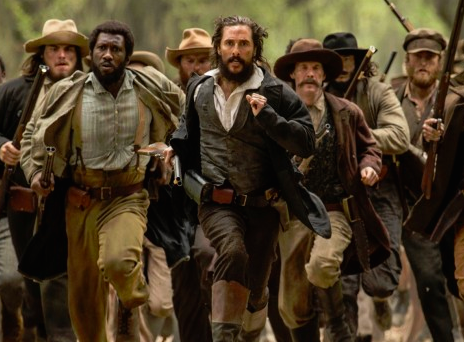Face The Music
I just saw a trailer for a new Tarzan film. I've seen plenty of old Tarzan movies where the British Empire is an accepted fact that is, if anything, a good thing. I get the feeling that won't be happening in this new Tarzan.
Then I saw a trailer for a new Matthew McConaughey film, Free State Of Jones, where a bunch of deserters from the Confederacy during the Civil War band with African-Americans and form their own community. I believe it's loosely based on the story of Newton Knight, but whatever happens, I can't help but think the good guys attitudes will reflect political beliefs of 2016.
The question is do the filmmakers just think every sensible person in the past thought as we do today, because, after all, they weren't stupid? Or, more likely, do they believe their characters have to act in ways that make sense to viewers today or they'll lose the sympathy of the audience?
All this is a roundabout way of noting I've been reading a book How Music Grew: From Prehistoric Times To The Present Day, by Marion Bauer and Ethyl Peyser, first published in 1925, revised in 1939.
At over 600 pages, it's quite informative. For instance, look at Chapter II--"The Savage Makes His Music." (Isn't it awful how these two women were so brainwashed they used the masculine pronoun?) One section of this chapter has the heading "The Negro And His Music." Here's a small sample.
When the English first came to Virginia and founded Jamestown in 1607 they started to grow tobacco on great plantations, and for this they needed cheap labor. They tried to use Indians, but as the work killed so many of them, they had negroes sent over from Africa to do it.
Where's Donald Trump when you need him? They continue:
Like other savages, the African negro loved rhythm better than melody. His songs were monotonous and were made up of a few tones and short repeated phrases.
Didn't I tell you it was informative?
Anyway, this is why I love reading old texts. Thoughts of the age are preserved--not just the explicit ideas, but the unquestioned assumptions. We can laugh at them (or be horrified), but better we recognize the laugh will eventually be on us.



4 Comments:
Think about vegetarians 100 years from now writing about a barbaric meat-based culture
These Petarians will also remark aghast that people enslaved animals as props for their homes, living with their waste and shedding in their houses and neighborhoods.
(Note: I despise our family cat at the moment).
When I got to the sentence that reads "(Isn't it awful how these two women were so brainwashed they used the masculine pronoun?)", two things happened. First, I actually laughed out loud. Second, I had to double-check that this was written by LAGuy, not Columbus Guy. Or perhaps -- hmm, a snide aside combined with witty prose -- are you Guys now collaborating?
Also, re: "We can laugh at them (or be horrified), but better we recognize the laugh will eventually be on us." Very true. Every English major knows Jane Austen's line about "For what do we live, but to make sport for our neighbors, and laugh at them in our turn?", but I suspect that due to poor reading skills, many of them don't realize that it's a symmetrical sentence which cuts both ways.
Humorlessness is the mark of the radical who is certain that he--or she--is right.
Post a Comment
<< Home